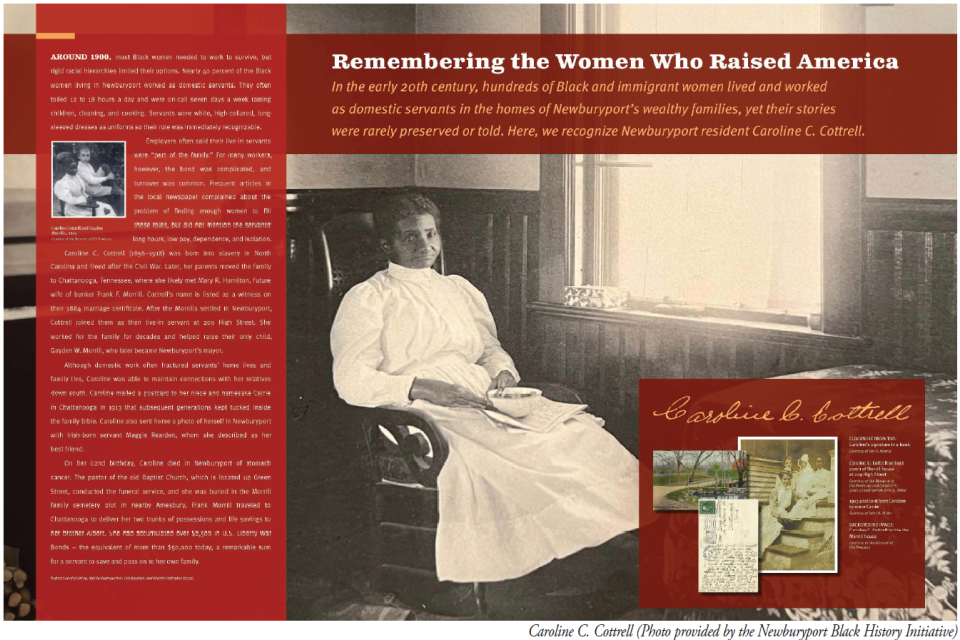NEWBURYPORT – The Newburyport Black History Initiative (NBHI) unveiled Sunday its latest informative plaque to inform and honor the black domestic workers who worked and lived in the city,
The NBHI, which has erected 11 informative plaques around the city honoring black residents who once lived and worked here, honored Caroline C. Cottrell, the nanny for the Morrill family and specifically Gayden Morrill, the only child, who grew up to be one of the city’s most acclaimed mayors.
At the invitation of Rev. Rebecca Bryan, a service was held at the Universal Unitarian Church, where the Morrills attended church and owned Pew 13. NBHI co-founder Dr. Cyd Raschke made a presentation and conducted a panel discussion about the role domestic servants played after the Civil War in Newburyport.
Around 1900, nearly 40 percent of the Black women living in Newburyport worked as domestic servants. They often worked 12- to 18-hour days and were on-call seven days a week, raising children, cleaning and cooking.
The women wore white, high-collared, long-sleeved dress uniforms so their role was immediately recognizable. Although it was common for employers to say their servants were part of the family, they often suffered from low pay for their long hours and were dependent on the family.
Caroline C. Cottrell, born in 1856 into slavery in North Carolina, was freed after the Civil War and later moved with her parents to Chattanooga, TN. There she likely met Mary R. Hamilton, future wife of banker Frank F. Morrill. Cottrell is listed as a witness on the Morrills’ 1884 marriage certificate.
After the Morrills settled in Newburyport, Cottrell joined them as their live-in servant at 209 High Street. Cottrell, who was literate and wrote beautifully, worked for the family for decades and helped raise their only child, Gayden W. Morrill.
As mayor between 1932 and 1935, Gayden Morrill oversaw the construction of the Newburyport High School. He was devoted to his nanny throughout his life.
“Who knows if the high school would have been built on time and on budget if it were not for her?” Rashke asked.
“Servants were undervalued in the roles they played after the Civil War,” she said in an interview.
The text on the sign, written by two other NBHI founders, Dr. Kabria Baumgartner, an associate professor of History and Africana Studies at Northeastern University and senior city planner Jordie Vining, states: “Although domestic work often fractured servants’ home lives and family ties, Caroline was able to maintain connections with her relatives down south. Caroline mailed a postcard to her niece and namesake Carrie in Chattanooga in 1913 that subsequent generations kept tucked inside the family bible. Caroline also sent home a photo of herself in Newburyport with Irish-born servant Maggie Reardon, whom she described as her best friend. “
She died on her 62nd birthday of stomach cancer. According to the plaque, “The pastor of the old Baptist Church, which is located nearby up Green Street, conducted the funeral service, and she was buried in the Morrill family cemetery plot in nearby Amesbury.”
Frank Morrill delivered two trunks of possessions and life savings to her brother Albert in Chattanooga. She had accumulated more than $2,500 in U.S. Liberty War Bonds, the equivalent of more than $50,000 today.
To learn more about the NBHI, visit https://www.cityofnewburyport.com/planning-development/newburyport-black-history-initiative. ♦




